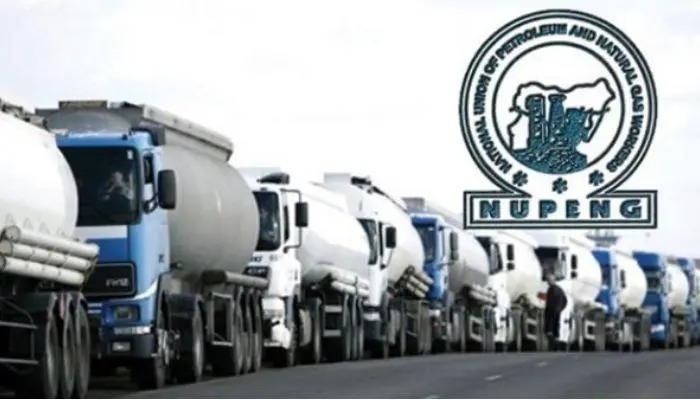The Nigerian Union of Petroleum and Natural Gas Workers (NUPENG) initiated a two-day strike action, primarily targeting the Dangote Refinery, over a dispute concerning the unionization of its tanker drivers. The strike, which commenced on Monday, caused widespread disruption in the petroleum sector, with tanker drivers refusing to load fuel, leading to the closure of filling stations and the shutdown of key petroleum facilities like the Aradel refinery in Port Harcourt and the Kwale Hydrocarbon facility in Delta State. This action arose from NUPENG’s allegation that the Dangote Refinery intended to prohibit the drivers employed for its fleet of 4,000 trucks from joining the union, thereby undermining workers’ rights and potentially creating an unfair labor environment.
The strike’s impact was significant, effectively paralyzing activities at petroleum depots nationwide. Tanker drivers adhered to NUPENG’s directive, halting fuel transportation and causing concern about potential fuel shortages. NUPENG officials actively monitored the situation, ensuring compliance with the strike action at various depots, particularly in Lagos and Warri. While the Federal Government appealed to NUPENG to reconsider the strike, emphasizing the potential disruption to fuel supplies, the union initially remained resolute, citing the importance of protecting workers’ rights and ensuring fair labor practices within the petroleum sector.
The situation took a positive turn on Tuesday when NUPENG announced the suspension of the strike following a meeting with representatives of the Dangote Group, facilitated by the Department of State Services (DSS). The meeting resulted in a significant breakthrough, with the Dangote Refinery agreeing to allow its drivers to unionize. This agreement addressed the core issue raised by NUPENG, paving the way for the resumption of fuel loading and distribution activities. The resolution underscores the importance of dialogue and negotiation in resolving labor disputes and preventing further disruption to critical sectors of the economy.
The swift resolution of the strike averted a potentially more severe fuel crisis, highlighting the crucial role tanker drivers play in the nation’s fuel supply chain. The Dangote Refinery’s decision to permit unionization represents a victory for NUPENG and reinforces the importance of recognizing workers’ rights to organize and bargain collectively. This outcome also demonstrates the effectiveness of engaging in dialogue and mediation to resolve industrial disputes amicably, minimizing the negative impact on both businesses and the wider public.
The successful resolution of this dispute underscores the critical need for clear communication and proactive engagement between employers and labor unions in the petroleum sector. By addressing concerns promptly and seeking common ground, both parties can avoid disruptive actions like strikes, ensuring the smooth operation of the fuel supply chain and preventing negative consequences for the economy. The Dangote Refinery’s acceptance of unionization sets a positive precedent for other companies in the sector, emphasizing the importance of respecting workers’ rights and fostering a positive labor environment.
This incident also emphasizes the importance of government intervention in mediating labor disputes, particularly in critical sectors like the petroleum industry. The involvement of the DSS facilitated the meeting between NUPENG and the Dangote Group, contributing significantly to the swift resolution of the strike. This highlights the value of government agencies acting as facilitators and mediators to ensure that disputes are addressed effectively and that essential services are not unduly disrupted. The outcome serves as a valuable lesson in the importance of collaboration between stakeholders in maintaining industrial harmony and ensuring the stability of vital sectors of the economy.














